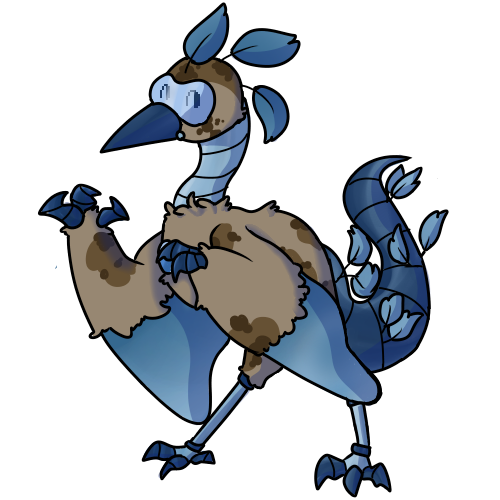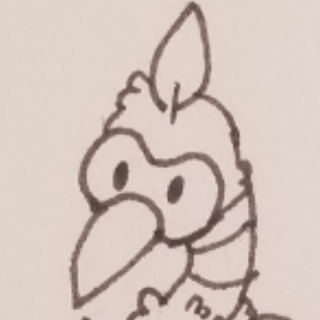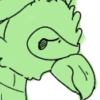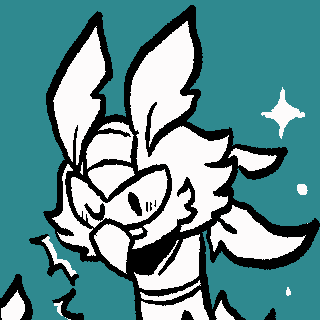[Cosmosdex] The Universal Encyclopedia
[Cosmosdex]
Plumari
Prismatic Birds / Faux Harpies
Plumari

Art by, Stumpios
- Strength-4
- Intelligence-4
- Charisma-5
- Endurance-6
- Agility-7
- Luck-0
Common Jobs: Dance teachers, Life coaches, Therapists
Likes: Shiny objects, Inspiring people, Shining their feathers
Dislikes: Being called vain, Being compared to harpies, People with no direction
Attack Method: A plumari will attempt to scare an enemy away with their wings before attacking with sharp kicks while attempting to keep the enemy in place with globs of clockwork slime. They will use their feathers as darts as a last resort.
Attributes
Homeplanet: PrismaticaLifespan: 150 years
Size: 3.6 ft tall, 5.6 ft long
Diet: Meat, Metal
Bodytype: Horizontal Pose
Type: Clockwork Avian
Social Class: Lowest Class
Rarity: Extremely Rare
Common Traits
This character has an affinity for fashion, and will often have a large wardrobe. They have a tendency to change their clothes often and put together outfits they find appropriate for their situation.
This character inspires those around them to do their best! Characters will do tasks better with this character around. An inspirational speech done by this character will cause morale to go way up for a whole group.
For whatever reason; this character is blamed for everything that happens nearby.
Gods
Plumari aren't particularly known for being religious, but may adjust to worship upon reaching space.
Gods: None
Original Creator: Stumpios
Physical Description
Plumari are avian creatures with particularly long metallic legs, tails, and necks, as well as eyes displayed upon a simple screen, similar in shape to a common sleeping mask. They naturally have dull feathers, ranging from a scale of browns to greys. While the vast majority of these feathers are a more "natural" keratin, a few metal-based feathers sprout from their heads and tails. These metal feathers have a stiff base, and can be painlessly removed for a plumari to use as darts. Though, this is incredibly uncommon, as most plumari believe something like that would damage their appearance.
Plumari, by default, aren't entirely varied in where they will have metal integration. Aside from the aforementioned neck, tail, legs, and feathers, plumari also have metallic claws at the bend of their wings, alongside long sheets of metal that sprout from their wings, about doubling the size. These sheets of metal are commonly referred to as their "wing-plates".
Their wing-plates specifically are made of a heavier amount of metal. While this prevents them from flying, plumari use their wings for a different purpose: scaring off larger clockworks. While still being natural predators, plumari are much smaller than many of the more aggressive strains on the planet. Due to this, they adapted to find ways to defend their catches from larger clockworks. This adaptation is the source of the wing-plates, as a plumari can shake their wings to produce a startling, deafening sound, which is typically enough to scare off most of the more common competing strains on the planet.
This description might be confusing to those who have only seen off-planet plumari. While naturally, plumari have dull wings and bright metallic parts, off-planet plumari are the inverse. As they had to repair damaged body parts, and continue to integrate metal to fuel this natural repair, their metals lose their sheen and become more typical with what people expect of clockworks. While it can take time for the sheen to leave their legs and tails, it's more noticeable in their claws, metallic feathers, and wingplates, as these parts of their bodies are often in a constant state of repairing the damaged surface. This leads many plumari to either dye their non-metal feathers to brighter colors, or, more commonly, wear a variety of brightly colored accessories.
Plumari ambassadors have requested it to be noted that multiple studies have shown no link between the plumari species and the harpy strain.
Personality
A key aspect of plumari culture is valuing one's strengths. To plumari, there's no greater joy in life than self-improvement and self-appreciation, in healthy doses. Calling this joy and aspiration vanity is seen as a great offense to any typical plumari, and the fastest way to get one to exit a conversation entirely.
This misconception of vanity is rooted mostly with homeworld plumari. This is due to their tendency to put their pride and energy into tending to their metal, with its bright colors. This is in part due to bright colors being as common as breathable air on the planet, and in part due to the evolutionary advantage that came with bright colors. It should be noted that due to this, it is considered a high offense to remove a plumari's metallic feathers without explicit permission. Even if they do grow back, it can take months, and will leave a plumari deeply upset until the feather or feathers return.
This is not all plumari care about, however. Plumari tend to focus on one to three aspirations at a time, though these focuses can change rapidly throughout their lives. Common sources of aspiration for plumari include dance, their appearance, and being a guide for other people in finding their strengths. As much as plumari value their own abilities, they put just as much into wanting others to find a source of aspiration as well.
As such, when a plumari gets close to an individual, it's not uncommon for them to spend time understanding a person's strong points. A plumari will learn what a person is the best at, and strive to help them in their efforts to improve this. For example, if a plumari becomes friends with an aspiring artist, then the plumari will find new, high-quality art supplies for them, show them classes to improve their skill, and encourage the artist to practice daily. Plumari thrive on this sort of positive reinforcement and encouragement, and as such, want other people to feel it too.
Once again, this might come as a surprise, considering the sharp contrast between off-planet and on-planet plumari. There is a starkly high turnaround rate for plumari in their first year of spacefaring. (Estimated at about 60 to 70%) This is mostly in part due to the massive whiplash due to both stigma against clockwork species, and their specific species bearing heavy resemblance to the harpy strain. Plumari who manage to make it through their first year in spacefaring likely have either some kind of support system, an unbiased crew, or a specific purpose for being out in space.
The plumari that most people are familiar with tend to fall into people-pleasing behaviors, and are more prone to other mental health and self esteem issues. Support groups are a commonplace for off-planet plumari, and it's rare to see one unaccompanied by any individual. Not only are plumari incredibly social by default, but they are also incredibly reliant on the support of others to cope with the change from their home environment.
Plumari born off-planet lack the vast majority of these damaging mental health issues, but may still struggle with self image.
History
Due to the nature of the plumaris' home planet, most of their history is centered around their efforts to preserve not only their own lives and cities, but the non-clockwork life of the planet. Many of the stories plumari tell today are steeped in morals of conserving resources and being respectful towards the non-clockwork nature.
The plumari species' first taste of the outside universe was one that many species are familiar with: an exploration crew landing on the planet.
This crew had immediately documented the plumari homeplanet as high risk, due to the high amount of high-danger strains that infected the surrounding wildlands. In the original exploration of this planet, plumari had been simply marked down as another one of the strains to be eradicated off the planet. However, this had been vehemently corrected after one expedition, which a log from has been provided to the Cosmosdex:
We had reached a dead end, and could only hope we had enough fuel to scare off the massive monstrosity of flesh and metal. Most of our flames had been spent scaring off smaller strains and scavengers, but this creature was bigger than anything else we had seen on this planet.
Just when we thought we were dead in the water, a group of what we had assumed to be yet another strain of clockworks approached. They shook their wings, and made some horrendous sound- like thunder or a great beast roaring. It was enough to send the other clockwork running, and we could only assume that these creatures had wanted us as prey instead. When we had raised our weapons to fire, our translator stopped us. He said that these clockworks were speaking, and wanted us to follow them. While I will admit our translator isn't the brightest fellow, he'd never lie about something like this.
And so we followed these avian clockworks, against our own self-preservation. And it's nothing but an anti-blessing that we did. We were taken to what appeared to be an underground roadway, and brought within the confines of some strange, shining city. The buildings were made of metal, yet shimmered like iridescent beetles. It felt like something out of a fairytale.
Though this encounter, along with several investigations on the nature of the plumari's lack of relation to other aggressive strains were enough to prove the species worthy of recognition, there were other battles to be fought. Excluding the clockwork-typical discrimination, time and time again the laws and resources of Prismatica were abused and the plumari had to push for their planet's protection. Both for their cities, and for help in decreasing the danger from aggressive strains overrunning the planet.
Although tourism and poaching has brought Prismatica into the space age, it should be noted the effect on the plumaris' way of life is stark. The metal that is taken to be sold off as jewlery is essential not just plumari culture, but their buildings, infrastructure, and very appearance.
Calling these issues "history" is somewhat inaccurate though, as they're still present to this day, if in smaller amounts.
Subspecies
Sandscrapers: A smaller, more agile species of plumari. With dull, sandy feathers to reflect their environment, sandscraper plumari are commonly found near large bodies of water. This subspecies is known for their thinner metallic plates, and thinner, sharp-tipped tails. Alongside this, sandscrapers have less qualms with using their metal feathers to use as miniature fishing spears. Due to their heightened fragility, sandscraper plumari have become increasingly distrustful of outside species.
Mountain Dwellers: More simply known as the mountain subspecies, this variety of plumari has much more metallic coverage than typical plumari. They are slower as a result, but much harder to damage. Where the metal covers is dependant on the individual, though coverage of the head and wings is common. While more friendly and calm due to their heightened endurance, mountain plumari are much more protective of their natural resources.
Special
Shimmering Metal: Plumari that reside on their homeworld have unusually colorful metal due to the high concentrations of it scattering the planet's surface and just below it. This offers no real benefit, but it's something that plumari hold in high regard.
Trivia
• Though it's considered extremely rude to take a plumari's feathers without permission, some plumari will sell their own feathers in bouquets, or as particularly fancy pens.
• While plumari with limited or no sight may not put as much effort into polishing their metal, other plumari will often help them with picking out matching metal colors and decorations.
• It's not uncommon to see plumari traveling alongside an umorus. The two species have a particularly close friendship, in spite of coming from vastly different home planets.



